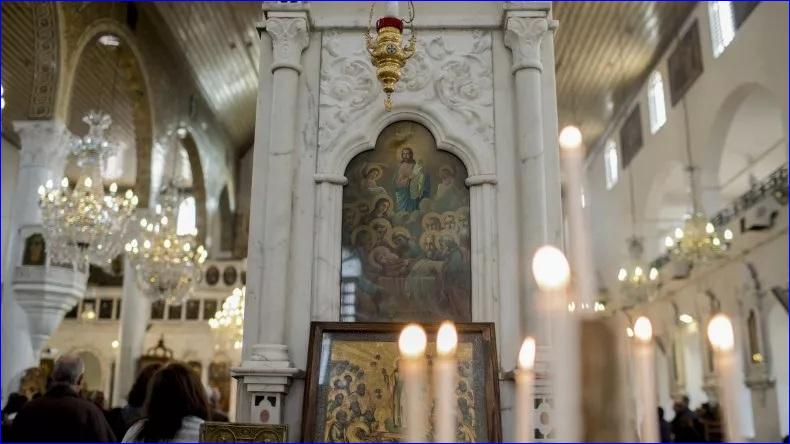


 Osama Al Maqdoni/Middle East Images/AFP/Getty Images)
Osama Al Maqdoni/Middle East Images/AFP/Getty Images)
Two months ago, on December 2, 2024, ADFA celebrated its 10-year anniversary in Södertälje, Sweden, home to a large Christian Middle Eastern diaspora. The day was marked by mixed emotions as two of our volunteers, Samuel and Harut, learned that Syrian towns had fallen to insurgents after Bashar al-Assad's exit. These men, who had fled Syria to escape conscription into Assad's army, were heartbroken as their families in Syria fled to mountains, fearing for their lives. Many Christians across Syria were uncertain about their future under insurgent rule, given the radical history of groups like HTS and their ties to ISIS and al-Qaeda.
Weeks later, the insurgents promised "equal rights," but many were skeptical. Samuel and Harut's families returned to their homes, celebrating Christmas with a mix of joy and fear, knowing they could not escape the uncertainty of their future. The situation was complex--jihadist factions in Syria had fractured, and former terrorist-controlled areas like Idlib had now seen a temporary, forced relaxation of their religious restrictions--Christmas trees and church masses were allowed.
Related: Timeline of ISIS in Iraq
Related: Attacks on Assyrians in Syria By ISIS and Other Muslim Groups
In Sweden, I met Razouk, a refugee who had fled Syria after being threatened by the Assad regime and severely tortured by a fundamentalist group. He had attempted to bring his family to safety via smuggling routes. He showed us pictures from the last FaceTime call with them. A couple of hours after our meeting Razouk found out that the boat sank, and his wife and two daughters drowned. This tragic event is a stark reality for many Christians in Syria. They were not just fleeing Assad's regime but also the threat of Islamic fundamentalists.
When the Syrian Assad regime was toppled, many outside Syria assumed Christians were aligned with the dictator. This is a misleading narrative. I have worked in the country, both with a journalist visa when that was possible and under a fake identity to conceal my actual intentions while reporting, where I learned that human trafficking syndicates cooperated with the regime.
Christians have been part of the opposition in Syria since the domestic war started in 2011. The Assyrian Democratic Organization (ADO), actively opposed Assad's government and joined the Syrian Opposition Coalition. George Sabra, a Christian, became a prominent figure in the National Coalition for Syrian Revolutionary and Opposition Forces. The Syriac Union Party (SUP) joined the U.S.-backed inter-ethnic coalition, the Syrian Democratic Forces (SDF), in 2015. SUP took a bold step by storming the Syrian embassy in Stockholm in 2012. SUP leaders faced brutal repression, including the arrest and disappearance of Swiss citizen Sait Malki Cosar, a distant relative of mine, in Qamishli, Syria, in 2013.
Christian leaders like Greek Orthodox Archbishop Paul Yazigi and Syriac Orthodox Archbishop Yohanna Ibrahim were abducted in Aleppo, and their fate still remains uncertain. I have written about that; they were abducted by terrorists. Did the regime have something to do with that? Both had been vocal in their opposition to the regime. Christians also joined the Free Syrian Army, a secular coalition that initially fought for a democratic Syria alongside Sunni Muslims, Kurds, and Druze. Abdulahad Astepho and Sanharib Mirza are Christian activists and politicians who have been advocating for a pluralistic Syria that includes all religious and ethnic groups since the start of the revolution, and they continue to advocate for a Syria where all ethnic and religious groups can live in dignity and peace.
While Sunni Muslims make up the majority of Syria's victims, numbers speak for themselves. Before the war, there were approximately 1.5 million Christians in Syria; today, fewer than 300,000 remain. ISIS and other terrorist groups ethnically cleansed Christians from towns, such as Armenians from Kassab and the Assyrians from the Khabour area and Syriacs from Homs and its surroundings, which were once home to vibrant Christian communities. The majority of Christians in Syria are Greek Orthodox. They have a substantial presence in urban areas and major cities like the capital Damascus and large towns like Aleppo. They were also severely affected by insurgents in Syria after 2011.
In the white paper issued by the esteemed IRF stakeholders, which will be presented to the Trump administration, we have included a call for greater focus on Syria, urging the assurance of equal rights for all citizens, including Christians, Druze, Alawites, and other minorities, while recognizing their Indigenous status. We are also advocating for women's rights. This is crucial for the long-term stability and future of Syria's diverse population. We are requesting the same in our contributions to bills and legislation.
At the International Religious Freedom Summit, we hope that our voices will be heard. The plight of Christians and other minorities in Syria is a pressing issue that must not be ignored.

or register to post a comment.